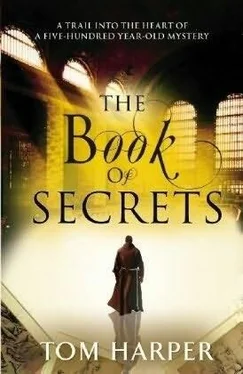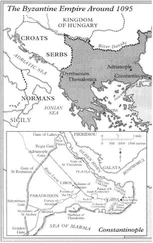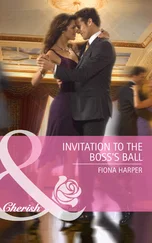I would have found it anyway. It stood opposite the cathedral, across the square, which had become a field of stones for the building of the new tower on the cathedral’s west front. I weaved my way between the vast blocks. On the far side, a gilded bear climbed an iron vine hanging over the door of a goldsmith’s shop.
I took the card from the bag that hung around my neck and held it up. I hardly needed to look. After four months every image was stamped on my being, as perfect a copy as the card itself. The bear in the top-left corner was the same, though on the card the vine was invisible.
I approached the shop nervously. It was too familiar: the rings on their spindles, the boxes of beads and corals, the gold plates and cups gleaming from the shadows behind the cabinet bars. Even the man at the counter reminded me of Konrad Schmidt, paternal in a way my own father never was. He offered me a wary welcome as I approached.
I held up the card and saw at once that he recognised it.
‘Did you make this?’
Paris
A fine mist hung in the Gare du Nord at eight o’clock that morning, as if steam was still settling from a hundred years ago. A policeman loitered by the café at the end of the platform and watched the passengers just arrived off the early train from Brussels. There weren’t many on a Saturday morning: clubbers not yet sober and football fans not yet drunk; a few solitary businessmen; gaggles of backpackers wearing shorts and sandals in their perpetual adolescent summer.
Last off the train came a curious couple – a man of about thirty in jeans and a long black coat, and a young woman in a high-necked red coat and bright red shoes. The policeman watched them. They were clearly travelling together, but there was an awkwardness between them that suggested unfamiliarity. They spoke without looking at each other; when the man had to squeeze past a pillar and brushed the woman’s arm, both apologised. A one-night stand, the policeman decided – two colleagues who had got drunk on business, too young to have made a habit of it yet. The man probably counted himself the luckier of the two. The girl was beautiful, in a prim sort of way. The policeman undressed her with his eyes, following the curve of her slim legs to the hem of her coat, then to the small, tightly belted waist and the full breasts above, to the dark eyes, disarranged hair and provocatively scarlet lips. The man just looked scruffy and dazed. Perhaps he had a wife to face.
Nick’s stomach tightened as he caught the policeman watching them. Had he been recognised? Was he on some sort of watch list? Had the NYPD circulated his photograph to Interpol? His movements felt more and more unnatural as he walked towards the policeman, his body seizing up under the pressure. He half-turned towards Emily and muttered something irrelevant; she nodded and looked uncomfortable.
At least the jet lag helped: it was hard to look too tense when you were still half asleep. Nick had spent the short night cramped upright on the plane while Emily dozed under a blanket next to him. Fear kept him awake right across the Atlantic: fear of what he had left behind, fear of what he would find waiting for him. Just as he’d begun to nod off, the cabin crew had turned on the lights to begin their descent into Brussels. Then it had been a rush through the airport, a taxi into the city and the first train to Paris. That had been Emily’s idea. From Brussels they could travel anywhere in Europe without having to show their passports again. Though there were other ways to be discovered.
Nick looked around and realised they were past the policeman. He was too tired to be relieved. At the back of the station they queued ten minutes for a taxi.
‘Cent soixante dix-sept rue de Rivoli,’ Emily told the driver. Nick looked at her in bleary-eyed surprise.
‘I spent six months here for my doctorate,’ she explained. ‘It’s hard to do much original research if you can’t speak the language.’
It reminded them both how little they knew each other. Emily clutched her bag on her lap and leaned against the door; Nick looked out the car window.
Number 177 rue de Rivoli was an anonymous building, a bank sandwiched between an American chain store and a shoe shop. A guard was just rolling back the iron security gate when they arrived. They got a coffee and a croissant in a café across the road and waited for other customers to arrive. Lost in their weary thoughts, they barely spoke to each other. Nick felt as if he was limping over the finish line of a long nightmarish race. All he wanted to do was give up and sleep.
At half past nine they walked into the bank. A receptionist behind a grey desk greeted them, and listened patiently while Emily explained that she had a valuable necklace her grandmother had given her and needed somewhere safe to store it while she pursued her studies in Paris for six months.
The receptionist nodded. They had deposit boxes available for just such a purpose.
‘Are they secure?’
The receptionist gave the sort of shrug they surely taught in all French schools. ‘Oui, je pense.’ She saw Nick looking blank and switched seamlessly to English. ‘You have a card which opens the door to the safe room, and a pin number to open your box.’
‘Et ça coûte combien?’ Emily persisted in French. ‘Now you pay five hundred euros, and then each month one hundred euros.’
Emily affected indecision. ‘Is it possible to see the safe room?’
The receptionist pointed to a glass-panelled door in the back wall. ‘C’est là.’
They walked over and peered through. Behind the door was a small carpeted room with rows of anonymous steel cabinets running from wall to wall. Red numbers glowed from digital readouts on their faces. Nick tried to find box 628 but couldn’t make out the numbers through the thick, bulletproof glass. Though the door looked like wood it was cold to the touch – three-inch steel.
‘I guess we’re not breaking in there,’ he muttered.
They went back to the receptionist. Emily reached in her purse and pulled out five hundred-euro notes and her passport.
The receptionist gave an apologetic smile. ‘You have to pay in advance six months. Another six hundred euros.’
Nick winced. Emily handed over the money and waited while the receptionist tapped the details into her computer. A machine under the desk spat out a plastic card, which she handed to Emily with her passport and a sheet of paper.
‘That is your PIN number. You have box 717. Merci beaucoup.’
Emily swiped her card. The steel door opened with a hiss of air, then closed with a heavy click the moment they’d stepped through. They walked silently across the carpeted floor. The red numbers on a thousand doors blinked from the sidelines, every one slightly out of sync with the others. Together with the harsh fluorescents above, Nick felt as if he’d stepped into a migraine.
Emily stopped in front of one of the deposit boxes. ‘This is 628.’
Nick angled himself so that he stood between Emily and the door, fighting back the urge to check if anyone was watching. Emily pulled on a pair of black leather gloves. With sharp, birdlike movements, she pecked out the number: 300481.
The door swung ajar. Emily reached in.
Hans Dunne the goldsmith took the card from my hand and glanced at it.
‘Where did you get this?’
‘A nobleman in Paris.’ A vision of Jacques’ broken face flashed before me. ‘He said it came from here.’
Dunne laid the card on his counter. ‘Not from me.’
Four months’ pent-up hope tottered on its foundations. Before it could crash, Dunne continued, ‘That was one of Kaspar Drach’s. The painter.’ A strange look crossed his face. ‘Among other things.’
‘Is he here?’
Читать дальше












